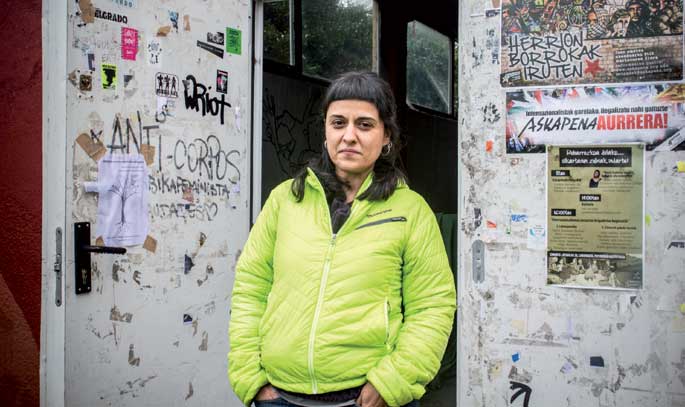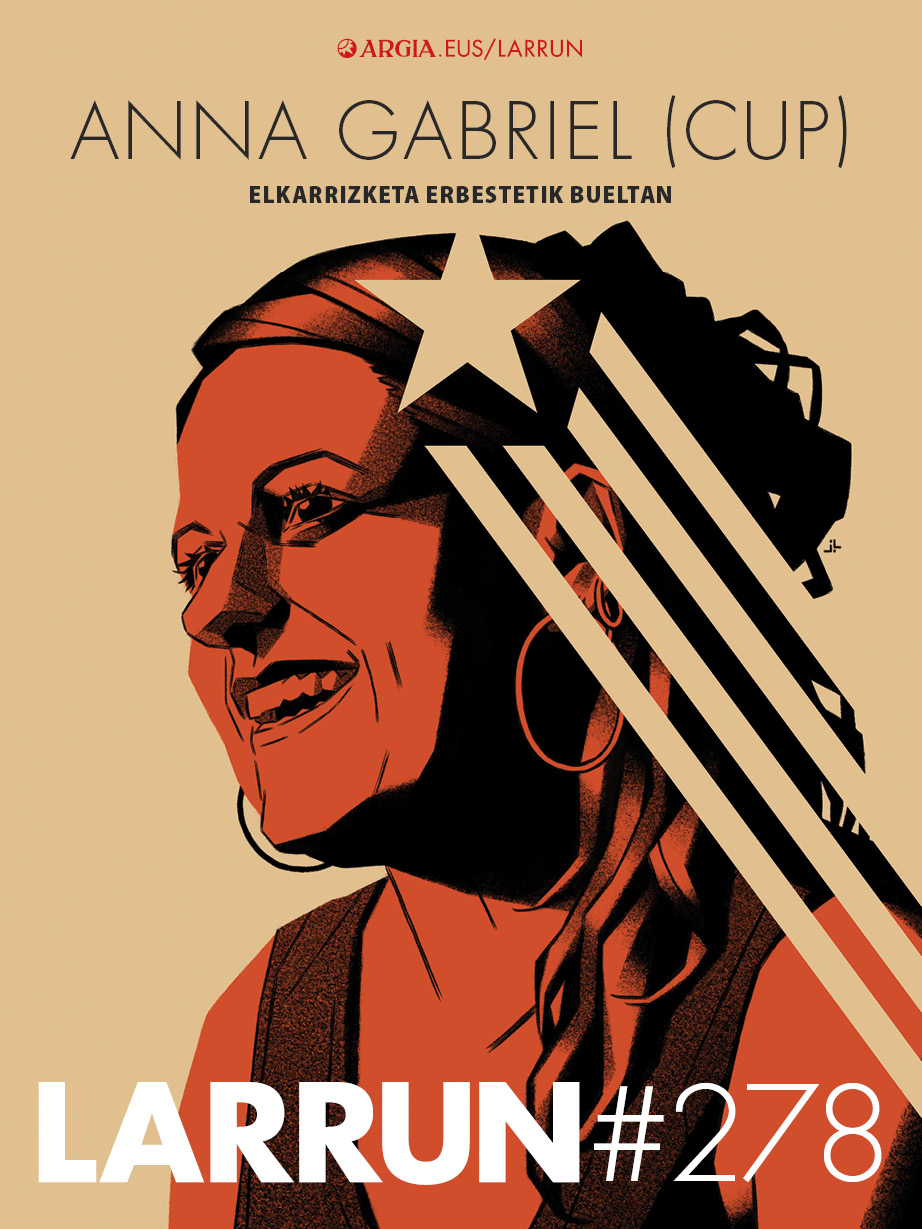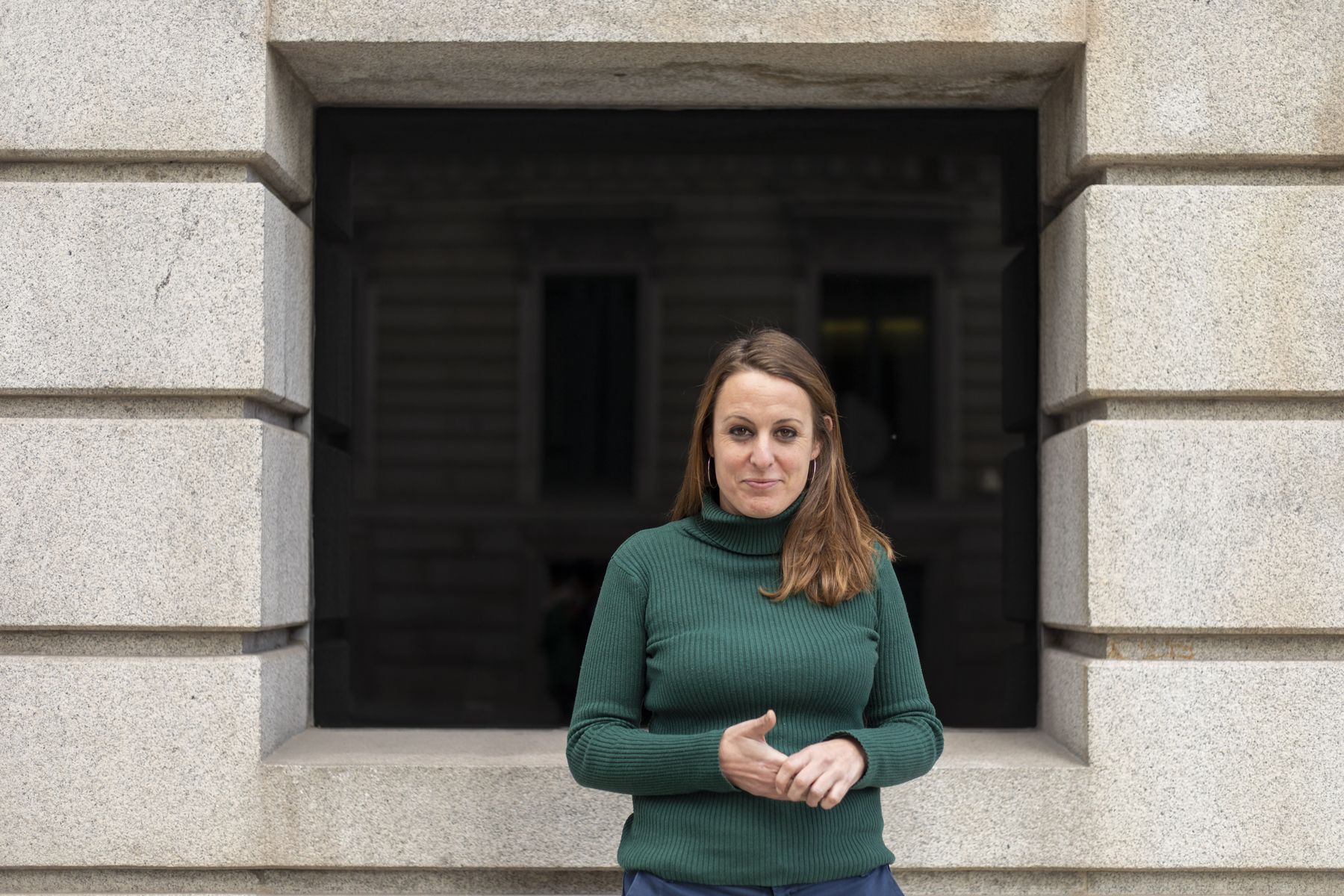"Independence will only be possible without ICU"
- The militancy of Anna Gabriel Sabaté (1975, Sallent, Barcelona) has been very diverse: organizer of the first Language (Catalan sister of the Korrika), member of the collective Terra i Llibertat since its creation, councilor, general secretary of the CUP, member of Endavat, carrier of the campaign "Independence, to change everything".. She currently serves as coordinator of the Cup group at the Parlament. His independence has a libertarian melody that we find unusual in Euskal Herria.

What is the best that the process of the Principality of Catalonia has left you?
Be in important moments and in mobilizations. For the first time for a long time we have been able to talk about the country we want, the totality and not just the political structure. Living the tensions of this historic period has given us great lessons; we have learned how strong enemies can be. And the enemies, in plural, digo.Nos would like it to be one and only.
Kicking the police in the morning and taking it in the afternoon of the Interior Minister?
We have never joined the counsellor and his political party. With ERC, Initiative and CIU, a priori, we share one objective: to give effect to the right to decide and that the Catalans can express it. On that road we have the same intention, but unity does not exist abstractly. It's not an uncritical unit. We maintain our passion for struggle, denunciation, criticism and level of protest. Otherwise it would not have been possible.
On the same day, in the morning, we can be working on the text in order to be able to conduct the consultation in the committee on the law, and in the afternoon you will see us in the demonstration against the rubber balls of the police. In these times, that is the everyday thing.
This is your first time in Parliament. Has the debate on participation in the elections been definitively closed?
It is advisable that there should be a debate prior to all elections. We must reflect in depth on the situation, the context, the forces and, above all, the objective of presenting ourselves to each election. Of course, we do not all share the same view. Some people think that the conditions for being present in the elections will not change in the short and medium term. Even if it is only to ratify the yes to go to the elections – because a majority is very clear about it – it will be absolutely advisable to discuss.
The popular movement and institutional power. The two sides of the same table, but who chooses the menu?
The menu must always be a popular movement, institutional representation must be its reflection and not the other way round. We represent the people organized in the institutions, not anyone else. The indignados represent us, we are not their representatives. That is our logic. For example, in the Interior Committees, in the committee in which Escuadra banned the use of rubber balls, our speeches, contributions and conclusions were created by groups working in the field of repression. If the speech and the debate are in advance, we do not generate anything; it is our duty to take them inside the institutions and defend them. That is the machinery, because if not, we would not understand what the representatives’ work is, to whom they give voice and to whom they represent.

What is the subject of change?
Some political groups believe that independence will coincide with that of the ICU. Others, on the other hand, say the opposite: only independence will be possible without ICU. The problem with them is not as a political party, but as a result of what CIU represents: the interests of the oligarchies and the bourgeoisie itself, and the selective way to understand Catalan identity and culture, which excludes the Catalan countries as a whole.
The debate on the patriotic front provokes this kind of tension: that the elite, the bourgeoisie, as it has more power and more means, think that the path to its own framework will be shorter. History has made it very clear to us what its role has been in the decisive moments. That's why some of us felt closer to the CNT than in the 1930s advocated the national framework.
It will be a feminist, otherwise there will be no change?
As feminist members say: “Feminism is always left for the next day.” Final link. Final touch of the dessert. And it's a fundamental element, rather than a final touch. There is still a long way to go, beyond putting women at the same level as men, which is the minimum. There is a need for a conception of the world that emerges from the logic of women's exclusion. Without privilege, the vision that gives you to live in a punished body must be the engine of change. But, well, it's also a logic that tends to prioritize struggles and goals. “First we get the state and then we will see what the socioeconomic model is” is also an idea that is believed and feels comfortable; it is the mentality that feminism leaves for the end of the final. The result has been obvious, with history as a witness.
The Cup has become one of the references of the debate on the municipality in Catalonia.
The municipal construction model of the CUP is a unique experience. It's not the only one or the best. The particularity is that the CUP was born out of there. Our first bet was towards the municipality and that was our only reality for a long time. Among the militants, therefore, the local logic is deeply rooted: the precise knowledge of the environment, the situation of the people, the challenges, the weaknesses, the capacities… we are used to looking for the real picture of reality.
If I had to draw the municipal fighting network of the Catalan countries, I would not only pick up the nuclei of the Cup, but also the places that the council has. It would extend the map. At the local level, it would also include those working for the transformation of the country: cooperatives, casals (self-managed spaces), toilets, youth movements, popular culture recovery groups, land defence, etc. That would be the municipality of Catalonia. We emphasize these manifestations of self-organization, the encounter and the construction of popular unity. This keeps alive the tension between the institution and the street, understood in a positive sense, between the councillors and the work of militants outside the institutions. In fact, councillors are always much less than those who are “out”. It is for that reason alone that, by its size, it is clear where the emphasis should be placed on political practice.

“Madrid, as a city model, is a terrorist act,” a friend from Castile once told me. And Barcelona?
Of course. In fact, the analysis of the members of the Barcelona Cup goes in the same direction. Barcelona is not comparable to any other Catalan city because of its population density, its economic structure, the nature of the city’s agents, etc. There are very aggressive dynamics beyond the City Hall, created by economic and political agents, lobbies, mafioso. To give a few examples: What to do with the tourist lobby? Listen to the Mossos? How to manage the port of Barcelona? And with the more than 40,000 tourists filling the Paseo de Gracia and buying in luxury shops, arriving every weekend by boat, what? These are stupid questions. We do not have enough strength to reverse this situation, nor do we have the citizenship of Barcelona. One thing is to be critical and another is to have the means to face it.
The case of a councilor with urban responsibilities in the Casco Viejo is very significant. Ciutat tried to deal with the mafia that is involved in the licensing of tourist apartments in Bella, where it is currently located. The young woman suffered threats, continued theft from her personal computer and was also the victim of threats and threats from her colleagues. Under their pressure, he resigned. This happened recently to a councillor working on behalf of the Socialist Party. What would happen to us, to the militants of the independence left, if we fought against that? I imagine ...
We want to build solid foundations in neighborhoods. In Barcelona, however, the neighborhoods today have an identity and a unique way of functioning, regardless of the classic model of the metropolis.
The appearance of Guanyem in Barcelona has reopened the debate on left-wing unity.
For those of us who are militants, for those of us who don't understand life without working in collective spaces, it's very satisfying that there are more people willing to act collectively. Guanyem is a political experience that has joined citizens without much awareness, without politicisation and without organisation. That, in itself, is joyful and interesting.
In the midst of the crisis of the bourgeois democratic system, bets are welcome that help break the consensus derived from the Spanish transition. That is why we wanted the forces that defended that transition model not to be present in that new political space. In the case of Barcelona, Initiative per Catalunya has been in the municipal government for 30 years. They have, to the extent that they are entitled, been responsible for a number of policies that we do not see with good eyes: The managers of the brand Barcelona, have helped to direct the city towards tourism, the promoters of the dangerous centrification policies that have evicted the humble people, and so on. We preferred not to be in the Guanyem Initiative. We have said so publicly. Some have understood it and others have called us sectarians, because in these times of distress we have not been able to meet others because, according to them, we have not been generous. Generosity in the same doses cannot be demanded of those who have been institutional managers and an entrepreneurial movement from the street and from political marginality. Initiative is pleased to have been approved in Guanyem, for having Ada Colau as the head of the list in the fight for housing. We have made it very easy for them to remain public representatives.
But I don't want to rush into the analysis. The reasons for Guanyem are also well argued. They have people of great value, whom we have known for a long time. There are a lot of people that we respect a lot. I would be glad if we were wrong and if Guanyem were to enter as a force for the break-up in the City Hall of Barcelona, if he had a firm stance in favour of self-determination in a decisive municipality, if he were to put an end to all the mafias of the city, if he were to seek solutions to the grave situation … After deciding that we should not stand together, I would like to think that he would have to correct my words. Because it would mean governing the people who want to change the Catalan capital.
“At best, one of the four parts of the Catalan countries will achieve a state with the same structures of power.” Do you agree with the phrase?
This has been our counterpoint in the process. It is not enough for Catalonia to get a copy of the modern states of Europe, more or less similar to the original. However, many of us would live happily in a state like the one we have, but if it were ours. In this sense, there are potential people and the illusion leads them to think: “the bourgeoisie will not disappear and we will have to continue militating, but it will be in a space of its own”. The problem would seem reasonable in this way, but in political action we must not lose an internationalist view, because otherwise we will forget the misery generated by the capitalist system.
Capitalism offers only hunger, death, destruction, war and mass graves for some parts of the world. Faced with this situation, we cannot settle for our own national framework, we cannot forget that the people who are dying in the world can live better. The loss of the internationalist view seems to me to be a selfish attitude and a cultural centre, full of identitarianism that has never represented our independence. We are not independentists because the Catalans are better than anyone else or because our ancestors lived here in the 15th century. Most of us are mestizos and our relatives are born in the Spanish state. We are independentists because we understand the conflict with the Spanish State on democratic bases, because the Spanish State does not respect the minima of democracy. This perspective distances you from identity attitudes and places you in the logic of friendship and fraternity.
You are the only political force in Catalonia that supports the departure of the European Union. Is there an alternative?
When we say that there is life outside the European Union, the euro and NATO, we are aware that so far no one in the Northern Cone or in Europe has achieved it. We therefore say this with respect, but we are convinced that it can be made possible.
We alone are not able to design the euro and the exit from the EU, but in our people there are people who are deepening in that direction and we want to work with them on that path. In this regard, we are working with colleagues at the Taifa Critical Economy Seminar. They are rereading Marxism, updating it to create an integral alternative to capitalism. We also collaborate with the Debt Audit Platform.
Our demand is that we all, and not just us, live better. And that will require us to be different. Implanting higher doses of austerity, not like the proposals of the troika, rethinking the role of private property and the property of the means of production, analyzing productive models… Moving away from the false social democratic positions that say that the future of the worker is to accumulate small properties. That's not northern. Our ultimate goal is a dignified life, knowing that we are not guilty of anyone’s oppression.
Egungo politika, polizia eta kartzela ereduei koloreak atera dizkio 4F kasuak, eta lehen lerrora ekarri du kazetaritza independentearen beharra.
Gai hau sarri albo batera utzi dute ezkerreko mugimenduek; “Kontrainformazio egunkariaren kontuaz arduratuko dira gure lau militante kazetariak, hori kontrolatzen dutenez, zeozer sortuko dute”, esanaz bigarren plano batean laga izan da komunikazioaren borroka.
Fedearen izenean gauza asko egiten dugu egunero arlo askotan eta komunikazioaren esparruan ere egin beharra daukagu. La Directa hasi zenean–oso oker ez banago 4. harpideduna naiz, David Fernandez baino lehenago! (barrez)– ez genekien proiektua ea ondo ala gaizki joango ote zen, baina beharrezkoa zela ziur ginen. 9 urte eta gero Ester Quintanaren kasuarengatik (Escuadra Mossoek jaurtitako pilotakada batek begia suntsitu zion 2012an) jende askok ezagutu zituen La Directaren balioak eta onurak. Harpidedunen igoera nabarmena eragin zuen kasu horrek, eta 4Frekin (Ciutat Morta dokumentalaren haritik sortutakoa) berdin gertatu da; berriz ere gora. Gehienak memento jakin batean jabetu dira horrelako proiektu komunikatiboen garrantziaz, baina militanteok lehendabiziko minututik oso garbi izan behar dugu haren baliagarritasuna. Une on eta txarretan proiektua sustatuko duen baldintzarik gabeko jarraitzaile leialen koltxoirik gabe nekez mantenduko dira-eta.
4F kasuari buruzko dokumentalak TV3n ikustea lortu izana ezin da azaldu La Directaren lana kontuan hartu barik. Jatorrian ez daude sare sozialak, Twitter, ezta CUPek Parlamentuan egindako galdera ere; hori gertatu zen ikerketa kazetaritzara dedikatutako jendea dagoelako. Gaitasun handiko kideak dira, kazetaritzaren inguruko ikusmolde paregabea dutenak. Haiek ez dute inoiz lan egingo euren buruaren jabe eta independenteak ez diren komunikabideentzat; egun prekaritate handiz jarduten badira ere. Jende horri zor handia diogu.
Eta TV3?
Kataluniako etapa demokratiko berri honetan telebista publikoa eduki izanak begi-bistakoak diren eragin positiboak izan ditu. TV3en eredua, jakina, kritikagarria da eta asko hobetu daiteke, baina katalanez bakarrik egindako telebista izate hutsa, adibidez, oso positiboa da berez. Telebista kate hori botere nagusiaren logikaren mendekoa da, baina, hala eta guztiz ere, beste hedabide gehienek baino kalitate informatibo handiagoa eskaintzen du.
Prentsaurrekoak eta edozein motatako parte-hartzeak katalanez eskainiko dituzte Herrialde Katalanetan. Erabaki hori hartu du CUPek Espainiako Auzitegi Gorenak ebatzi duelako ikastetxeetan ikasgaien laurdena gaztelaniaz eman behar dela.
Astearte gauean zenbait lagunek Felipe VI Espainiako erregearen argazkiak erre dituzte Banyoles herriko udaletxearen aurrean. Europako Giza Eskubideen Auzitegiak emandako sententzia ospatzeko egin dute.

























